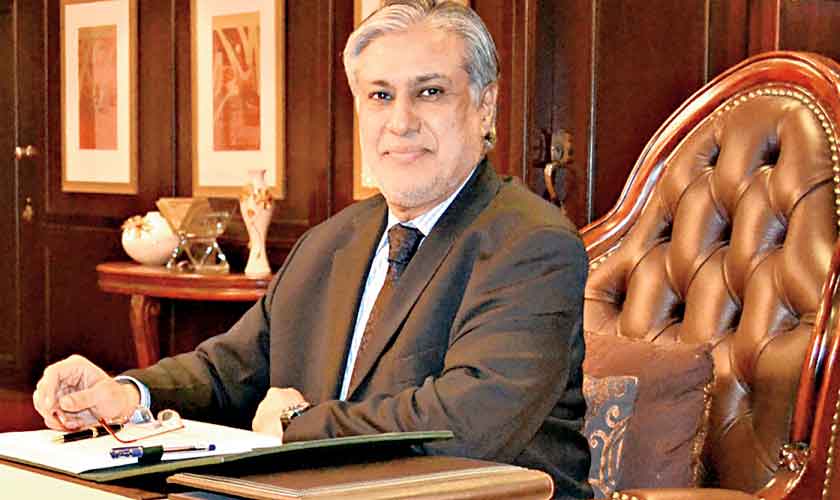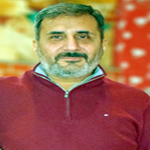Finally, Ishaq Dar has been sidelined as finance minister though confusion still persists who would run the finance ministry in his absence.

FOCUS
Finally, Ishaq Dar has been sidelined as finance minister though confusion still persists who would run the finance ministry in his absence.

Last week, when reports were pouring in that Ishaq Dar, one of the most close confidantes of ousted prime minister Nawaz Sharif, is being relieved of his duties in the wake of the mounting pressure he is facing over a string of court cases, Mussadiq Malik, the spokesman of the Prime Minister Shahid Khaqan Abbasi had the audacity to rebut the news.
But two days later a notification issued by the Cabinet Division was leaked to the media that Abbasi had sanctioned leave for the beleaguered finance minister on health grounds as he has been undergoing medical treatment at a London hospital.
The notification, however, did not specify the period for which the leave is granted and officials say this leave could last up to three months.
Interestingly, there was no official announcement for media from the Prime Minister House or from any other government spokesman.
Observers believe that the government is trying to put a brave face to situation so that it is not seen to be seen to be removing its own finance minister, who happens to be a close relative and key aid of the party head, unceremoniously.
But they believe that government could not escape inevitable as there are no chances of Mr Dar to return country in near future in view of the grave court challenges.
If this notification is to be believed than the Prime Minister Abbasi seems to have taken over the portfolio of the finance ministry and his advisor Miftah Ismail might now run the day-to-day affairs of the ministry until government takes final decision on the fate of Dar.
Abbasi has been a key member of the economic team led by Dar under Nawaz Sharif government. However, since his elevation to the position of prime minister, he has a lot of more work to do and one is not sure if he could spare enough time for the economy which is passing through a critical stage in view of the serious challenges it is set to face in the coming months.
Since the appointment of Khawaja Muhamamad Asif as foreign minister, the country has witnessed some good diplomatic initiatives providing an opportunity for Pakistan to effectively put across its point of view to the international community.
Miftah Ismail is expected to act as a bridge between the prime minister and the finance ministry and government sources are confident that the ministry would be run smoothly under this arrangement.
However, analysts believe that the government needs a full-time minister to run the key ministry. They allude to the performance of the ministry of foreign affairs under Sharif which was run by advisors and the former prime minister remained reluctant to appoint a full-fledge minister.
They say that the government should brace itself for the imminent economic challenges – particularly a potential balance of payment crisis – for which it needs an all-powerful economic team led by a dynamic leader.
The government leaders argue that the economic affairs was being run effectively since Prime Minister Abbasi was sworn in and they face no difficulty even in the absence of Dar.
They said the government is very much alive to the challenges faced by the economy of country like balance of payments issue and referred to its preparations to launch Islamic bonds or sukuk and Eurobonds this week to raise three billion dollars from the international market in order to ward off impending balance of payment crisis. Roadshows are being held in Dubai, Singapore, London, Houston and finally in New York by the team lead by Miftah Ismail.
Moreover, the government hopes that a lot of pressure over the external deficit would ease out with the operationalization of various projects under the China Pakistan Economic Corridor (CPEC).
Some analysts like Dr. Shahid Hasan Siddiqui believe that who would lead the economic team of the government is irrelevant at the time being.
“Even if some economic top-gun is imported from the United States, he would not do anything different from what is being done now,” Siddiqui said. “So whether it is Dar or non-Dar, an advisor or a minister is a non-issue in my opinion.”
He said since the government has effectively entered into the election phase so the main concentration is on how to win the elections instead of implementing any economic reforms.
Siddiqui said the balance of payment crisis could easily be averted through raising of money through bonds and the government as well as the caretaker set up would try to avoid to go back to the International Monetary Fund (IMF) and this option would be left to the next elected government.
He said this strategy has been in vogue since early 1990s when governments throw reform agenda to wind in the final years of tenure leaving a big mess for the incoming government.
“When new government comes in, it wants people to tighten their belts to correct the economy but when elections come closer all caution and prudence is left aside and whatever gains which have been made are wasted for political expediency.”
Analysts say the government is all set to dole out huge development funds for its lawmakers to carry out development projects in their constituencies to win the general elections due in 2018.
The government reportedly gave huge development funds to its lawmakers and those from the allied parties to ensure their presence in the recently held National Assembly session that voted a bill that allows Nawaz Sharif to stay as his party head despite disqualification from the Supreme Court.
The heavy presence of government lawmakers in the parliament, who otherwise remain absent, drew sarcastic remarks from the opposition leaders, saying that trick of greasing the palms of lawmakers have effectively worked.
“Election is the first priority and one cannot expect the powerful political lobby to allow implementation of economic reforms that may hurt its interests,” Siddiqui said. “Politics is now the first and foremost priority and economy is being put on back burner.”
The writer is a senior journalist based in Islamabad